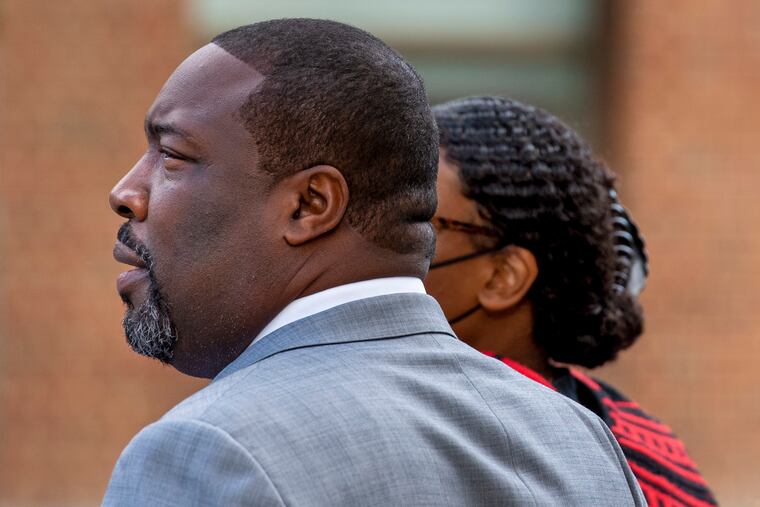Kenyatta Johnson’s bribery retrial begins with both sides pitching to a jury they hope can deliver a verdict
While the lawyers' opening pitches to the jury were largely familiar, small differences emerged in the arguments both sides presented during the first trial this spring.

The federal court rematch between Kenyatta Johnson and the U.S. government began Friday with prosecutors painting the Philadelphia city councilmember and his wife, Dawn Chavous, as “sophisticated and savvy political players” who lined their pockets with bribes — and the defense deriding the case as “much ado about nothing.”
Assistant U.S. Attorney Eric L. Gibson accused the three-term Democrat from Point Breeze of selling his office to a financially struggling nonprofit that needed help with real estate matters in his district.
“While Johnson held himself out as acting in the public interest,” the prosecutor said, “his family was privately, secretly paying a stream of benefits to act on behalf of a single organization” — Universal Companies, the South Philadelphia community development and charter school operator founded by music icon Kenny Gamble.
The duo’s attorneys, meanwhile, balked at the idea that the $67,000 Universal paid Chavous through consulting contracts between 2013 and 2016 was meant as a payoff for her husband.
“There is no evidence that Universal needed to bribe councilman Johnson,” defense lawyer Patrick Egan said. “And there’s no evidence that they did.”
If those opening statements — which played out Friday in a ninth-floor courtroom before a jury of eight women and four men — sound familiar, it’s because both sides largely stuck to scripts recognizable from their first matchup, which ended this spring in a hung jury and mistrial.
» READ MORE: Kenyatta Johnson's bribery retrial: What you need to know
Much of the evidence the lawyers hope to present is the same. Many of the witnesses from the first trial are set to return to the stand. And yet both sides are hoping this go-round will end in a conclusive verdict.
Should he be convicted, Johnson would become the second member of Council, after Bobby Henon, to lose his seat and face significant prison time due to a corruption conviction within a year.
But as Johnson, 48, and Chavous, 42, confidently strode into the federal courthouse Friday morning neither showed signs of concern. The couple declined to speak to reporters, as they did for much of the first trial.
In a statement released on Twitter, Johnson denied any guilt and said he and his wife “look forward to this second trial getting underway to clear our names.”
Prosecutors maintain that Johnson twice acted to protect Universal’s endangered real estate holdings.
In 2014, Johnson passed zoning legislation through Council that substantially increased the resale value of one property Universal owned, the storied Royal Theater on South Street. That same year, he used his authority to block the city from seizing another parcel of the nonprofit’s land at 13th and Bainbridge Streets.
In exchange, prosecutors say, two Universal executives — former CEO Rahim Islam and ex-CFO Shahied Dawan — paid the councilmember through what Gibson described Friday as a bogus contract with Chavous.
“The real value that Ms. Chavous provided to Universal, Islam, and Dawan was that she was married to Mr. Johnson,” he said.
But the defense scoffed at the government’s characterization of Chavous’ role at Universal as a “low-show job.” It’s no wonder Universal wanted to hire her, given her reputation as a well-connected consultant and lobbyist with a background in charter schools, said Egan, quipping: “It’s not like they found her in a Wendy’s drive through.”
Chavous, her lawyer Barry Gross maintained, spent hours earning every cent that Universal paid her by planning events, organizing meetings, escorting officials on tours of the nonprofit’s charter school campus, and keeping executives apprised of legislation in Harrisburg.
“She was an independent woman who had her own life and career before her marriage,” Gross told the panel. “And she had a life and career after her marriage.”
Despite the familiarity of much of the day’s arguments, small differences emerged from the versions both sides presented during the first trial — signs of their efforts to shore up their cases the second time around.
Prosecutors, for instance, made no mention Friday of Johnson and Chavous’ finances — a contentious plank of their case in the first set of proceedings, in which Gibson and his cocounsel, Mark Dubnoff, portrayed the duo as drowning in credit card debt, making them more susceptible to bribery.
The defense flatly rejected that characterization back then and accused the government of cherry-picking financial records to falsely portray the couple’s budget as bleak.
Gibson also stressed Friday that many of the government’s witnesses “aren’t happy to be here,” a seeming effort to warn jurors in advance after last time, when several prosecution witnesses offered glowing testimonials of Chavous’ work at Universal that ran counter to prosecutors’ case.
For his part, Egan returned to the question he asked repeatedly during the first trial: Why would Universal, whose community development mission Johnson supported, need to bribe his client in the first place?
But this time the attorney came armed with examples of Johnson using his office to aid the nonprofit and its staff long before the government alleges the nonprofit began paying him to do so. For instance, Egan noted, Johnson once helped Universal founder Gamble get his home rezoned.
“Why would Universal hire someone as a bribe for somebody they don’t need to bribe?” he said. “And why would Ms. Chavous do a whole lot of work when she didn’t have to?”
The trial is set to resume Monday.